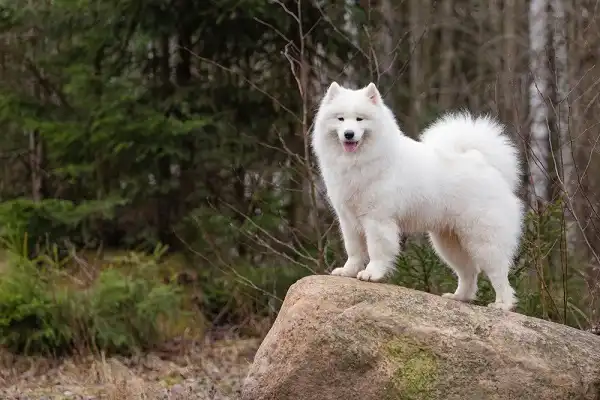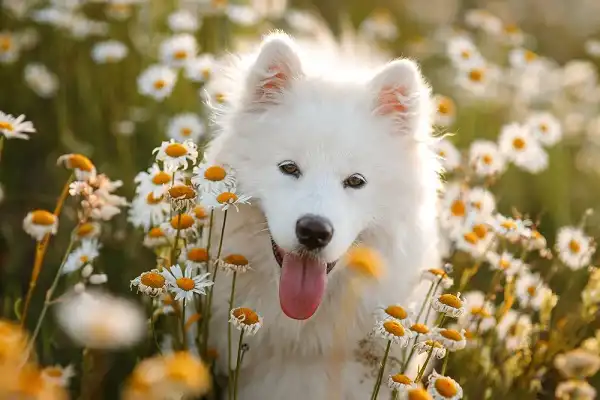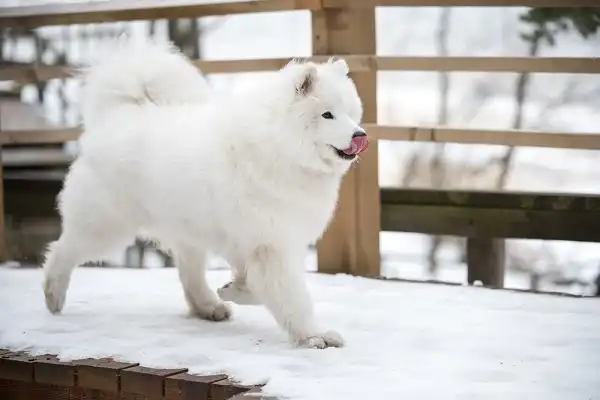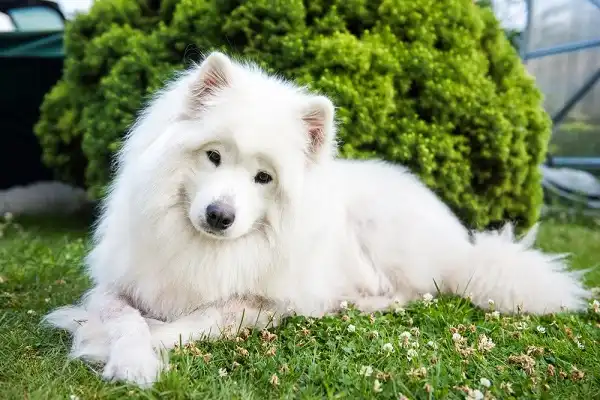If you’re looking for a breed of dog that is lively and friendly, the Samoyed may be the perfect match for you. This puffball of a pup originates from Russia, where they were used as working dogs in cold climates. Today, they make excellent family pets – and their thick coat means they’re well-suited for colder weather too. Read on to learn more about this lovable breed.

Samoyed Description
The Samoyed is a large breed of dog. They have thick white fur and bright, almond-shaped eyes that give them a friendly appearance. Their facial wrinkles and smiling expression have earned them the nickname “Smiling Sammy”. Samoyeds are active breeds who need regular exercise to stay healthy; daily walks or runs will help keep them in top shape. While they can live indoors, it’s best for their health if they can spend time outdoors as well. Samoyeds are intelligent dogs, so training should start early on – ideally
Samoyed Habitat
The Samoyed is originally from Siberia, where they were bred to serve as working dogs in extreme temperatures. They are well suited to colder climates, thanks to their thick white fur and double coat that helps keep them warm in the coldest of weather. While they can certainly live inside with their people, they enjoy having access to the outdoors so that they can run and play with their family. These active pups will appreciate a yard with some space for running and exercise, especially if it has a fence since Samoyeds are natural wanderers. And if you live in an area with snowfall, consider yourself lucky—Samoyeds love playing in the snow! Aside from being able to handle cold temperatures, Samoyeds also need plenty of socialization and mental stimulation. This includes activities like agility or obedience training, as well as plenty of walks and playtime with their family. They are quite adaptable, so even if you don’t have a large yard or open space you should still be able to get adequate exercise. In addition, these smart pups respond best when trained using positive reinforcement techniques like treats and praise—this helps build a strong bond between pups and humans while reinforcing desired behaviors like house-training or recall commands.
Samoyed Diet
The Samoyed is a breed of dog that does best with a diet rich in high-quality proteins and fats. They have an active lifestyle and need a diet that will help them stay full of energy. These dogs do best on a balanced, meat-based diet with plenty of whole grains and vegetables. As they are very active, they require more calories than the average dog, so their meals should be high in protein, fat, and carbohydrates. When preparing meals for your Samoyed, make sure to include lean meats such as chicken, beef, or fish as well as eggs. You can also give them some low-fat dairy products like yogurt or cheese. For carbohydrates, try offering whole-grain oats or barley along with some leafy greens like spinach or broccoli. Adding foods like sweet potatoes and carrots will provide additional vitamins and minerals that are important for your pup’s health. It’s important to note that Samoyeds are prone to obesity if overfed or given too many treats; therefore it is important to monitor their food intake closely and limit treats accordingly. A puppy should eat 3-4 meals per day while adult dogs typically only need 2 meals each day. It’s also important to factor in activity levels when determining the amount of food needed each day – puppies may need up to 30% more than their adult counterparts depending on the level of exercise they get on a regular basis.

Samoyed Size
The Samoyed breed is large in size, with males typically ranging from 20 to 24 inches tall and weighing up to 65 pounds. Females are usually slightly smaller and lighter than males, with a height range of 18 to 22 inches and a weight of up to 50 pounds. However, even within this size range, there can be quite a bit of variation depending on the dog’s age, health, and activity level. Overall Samoyeds are generally healthy dogs with no major breed-specific issues; however, they do need some extra care in terms of diet and exercise given their size. A good rule of thumb is that your pup should get at least 1 hour of moderate exercise each day—this could include things like walking, jogging, or running around in an outdoor space (as long as it’s securely fenced). Additionally, since these dogs have high metabolisms feeding them quality food regularly will help maintain their health throughout their lives.
Samoyed Lifespan
The Samoyed breed is known for its lively, friendly personality and beautiful white coat. There’s no denying that these dogs make wonderful family companions, but owners should also be aware of their longevity when considering the commitment involved in having a pet. On average, Samoyeds can live between 12-14 years with proper care and nutrition, but some may even make it to 16 years or more. A major factor that affects the lifespan of a Samoyed is diet. Providing quality nutrition throughout life is essential for promoting optimal health as most diseases and illnesses are related to dietary deficiencies. A healthy balance of proteins (animal-based sources are best) and carbohydrates (such as whole grains) should form the foundation of your pup’s diet along with natural supplements like omega-3 fatty acids or glucosamine for joint health. Aside from nutrition, regular exercise is also key in helping your pup stay healthy over time; this includes both physical activities such as walks/runs in the park and mental stimulation through interactive games or activities like agility training. Taking your pup out for a walk not only keeps them active but also helps ensure they receive adequate socialization which plays an important role in overall well-being.
Samoyed Behavior
Samoyed Behavior is known to be lively, friendly, and full of energy. With regular exercise and socialization, they make great family companions that are always up for an adventure! Samoyeds are intelligent dogs, who can quickly pick up commands and simple tricks with proper training from a young age. They also have a strong prey drive which, when combined with their adventurous nature, can lead them into mischief if not monitored closely. Speaking of mischief – chewing is another behavior common in Samoyeds and is often thought to be their way of relieving stress or boredom. To prevent any property damage it’s important to invest in quality chew toys and rotate them regularly so the pup doesn’t become bored with the same old toy. Overall, Samoyeds have an energetic personality combined with intelligence and loyalty that makes them ideal family pets—especially when given the right amount of attention and care! With plenty of exercise plus mental stimulation in the form of interactive games or activities like agility training, your pup will stay happy and healthy throughout its long lifespan.

Samoyed Speed
Samoyeds are known for their quickness, agility, and stamina. They are a medium-sized breed of dog that loves to run, which makes them well-suited for activities like agility, jogging or even sledding. Samoyeds have a natural urge to be on the move and can often keep up with some of the fastest breeds when it comes to timed events such as racing or herding competitions. The average Samoyed will reach speeds of about 20 miles per hour over short distances and can maintain this speed for several minutes at a time. This makes them excellent competitors in most canine sports such as flyball and agility; however, their endurance is also quite impressive and they can typically outlast many other breeds when running for extended periods. Aside from the physical advantages, Samoyeds also possess mental acuity that allows them to take cues quickly and respond accordingly; this helps them stay focused during long competitions that require quick decision makings such as sheep herding or coursing events. With regular training and plenty of opportunities to exercise, these dogs can develop remarkable speed and strength which can help increase their performance in various types of races or competitions.
Samoyed Hunting
Samoyeds are natural hunters with keen noses and eyes that make them great assets for tracking and hunting games. These dogs have a strong prey drive and will instinctively follow any scent or movement they perceive in their environment. This makes them ideal for hunting small game such as rabbits, hares, squirrels, and grouse. When it comes to larger animals, Samoyeds are well-suited for tracking large game like deer and elk. Their thick double coats make them surprisingly stealthy in the wilderness, allowing them to easily blend into their surroundings while on a hunt. They also possess an impressive level of stamina that allows them to stay on the trail of their quarry for extended periods of time if necessary. In addition to a strong prey drive, Samoyeds also have a natural curiosity that helps keep them alert to potential threats and unexpected changes in their environment. This trait is beneficial when it comes to hunting because it means they can quickly react to any sudden movements or changes in the terrain without missing out on an opportunity for success. While these pups are not typically aggressive by nature, they do possess enough confidence and courage to handle most situations associated with hunting large game with minimal danger. When it comes to using a gun or bow during a hunt, Samoyeds must be trained properly from an early age so that they understand the proper safety protocols associated with each type of weapon being used.

Conclusion
The Samoyed is a wonderful breed of dog that possess all the necessary qualities for both timed events such as racing and herding competitions, as well as big game hunting. They have an incredible level of speed and endurance which allows them to outlast most other breeds during races or long hunts. In addition, these pups also possess sharp instincts with a natural curiosity that helps keep them alert to potential threats in their environment. With proper training and plenty of opportunities to exercise, Samoyeds can be excellent companions who are always ready for whatever adventure life throws at them
Frequently Asked Question


